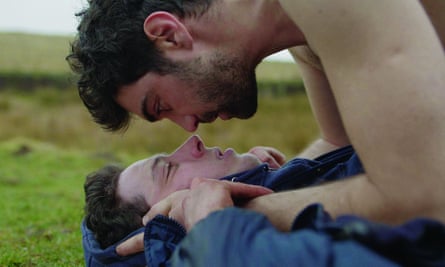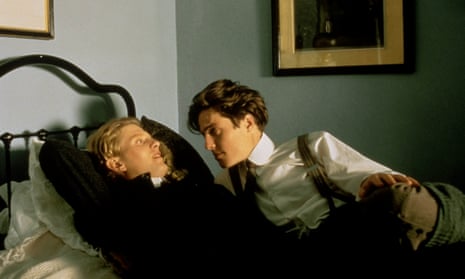In 1987, Ismail Merchant and James Ivory’s film Maurice was released – their first film after A Room With a View. They were both adaptations of EM Forster novels. But if A Room With a View was sunny, romantic and charming, Maurice, by contrast, seemed darker, more brooding – and more, well, gay. In the film Maurice, played by James Wilby, and Clive (Hugh Grant), meet at Cambridge and are drawn together into a platonic relationship before Clive marries. Maurice, in a crisis of self-loathing, seeks a “cure” for his homosexuality, before falling in love with Clive’s gamekeeper, Scudder, played by Rupert Graves.
The film – released the year before the introduction of section 28, and into the midst of the Aids crisis – was respectfully received but has never had anything like the popular, Middle England appeal of A Room With a View. It was characteristic of the time that interviews with its makers referred to the fact that Merchant and Ivory lived together without ever suggesting that they were, in fact, together.
Maurice has just been rereleased in the UK, lavishly restored. Seen afresh, the film seems ahead of its time. Hollywood has still not caught up with its straightforward approach to male nudity, for instance: though the film is discreet on sex, it does allow the characters the dignity of moving around their bedrooms naked, rather than draped in strategically positioned sheets; it also, crucially, has a happy ending, offering the lovers an escape into love and truth rather than “punishing” them for their sexuality. And, for anyone who is still surprised at how superb an actor Grant turned out to be in the BBC’s recent A Very English Scandal, Maurice makes instructive viewing. In his first film role, Grant’s performance is captivating.
Ivory adapted the screenplay for the touching Call Me By Your Name, Luca Guadagnino’s film about a summer love affair between two young men. Those characters are untouched by the anguish that afflicts Maurice and Clive – no running away from the truth of the self, no spectre of prosecution but, rather, a delicate first love that flourishes over a long hot summer. But a more intriguing comparison might be with God’s Own Country, Francis Lee’s film – also from 2017 – about the connection that grows between Johnny, a young Yorkshire farmer and Gheorghe, a Romanian labourer who comes to help during lambing season. Johnny is effectively in charge of the farm and out of his depth; his father has had a stroke; his grandmother is doing her best but can offer Johnny little. After a hostile beginning between the two young men, Gheorghe teaches Johnny the kind of tenderness that has been dormant, at best, within his taciturn family.

As in Maurice, the family house itself plays a profound role. In the Merchant Ivory film, Clive’s eventual marital dwelling – where Maurice is invited to stay, and where he will eventually be found and loved by Scudder – is leaky and dilapidated, a reflection of Clive’s vulnerability despite his attempts to construct a watertight, conventional life. The final, desperately sad scene shows Clive shuttering the windows of his bedroom – both blotting out the threatening wildness of the world beyond, and imprisoning himself in a hypocritical marriage (the imagery is neatly borrowed from the novel).
In God’s Own Country, the film begins with the house seen in a bleak, grey dawn, a single light burning, as if to draw attention to Johnny’s profound aloneness. In Maurice, the gay lovers must find a life beyond conventional understandings of domesticity. But in God’s Own Country, there is something new: the integrity of the traditional household, threatened at the start of the film, can be renewed only by Johnny and Gheorghe together – through their partnership as farmers, and as lovers. The film ends not with a lonely man shuttering himself in, but with two men, arm in arm, walking through the door of their home. And the most quietly radical fact about that may not be that Johnny and Gheorghe are gay – but rather than Gheorghe is a Romanian immigrant. In these days of Brexit, God’s Own Country may be teaching us EM Forster’s adage – “only connect” – in a new way.
Charlotte Higgins is a Guardian columnist
- This article was amended on 15 August 2018, to correct the title of the television programme A Very English Scandal









